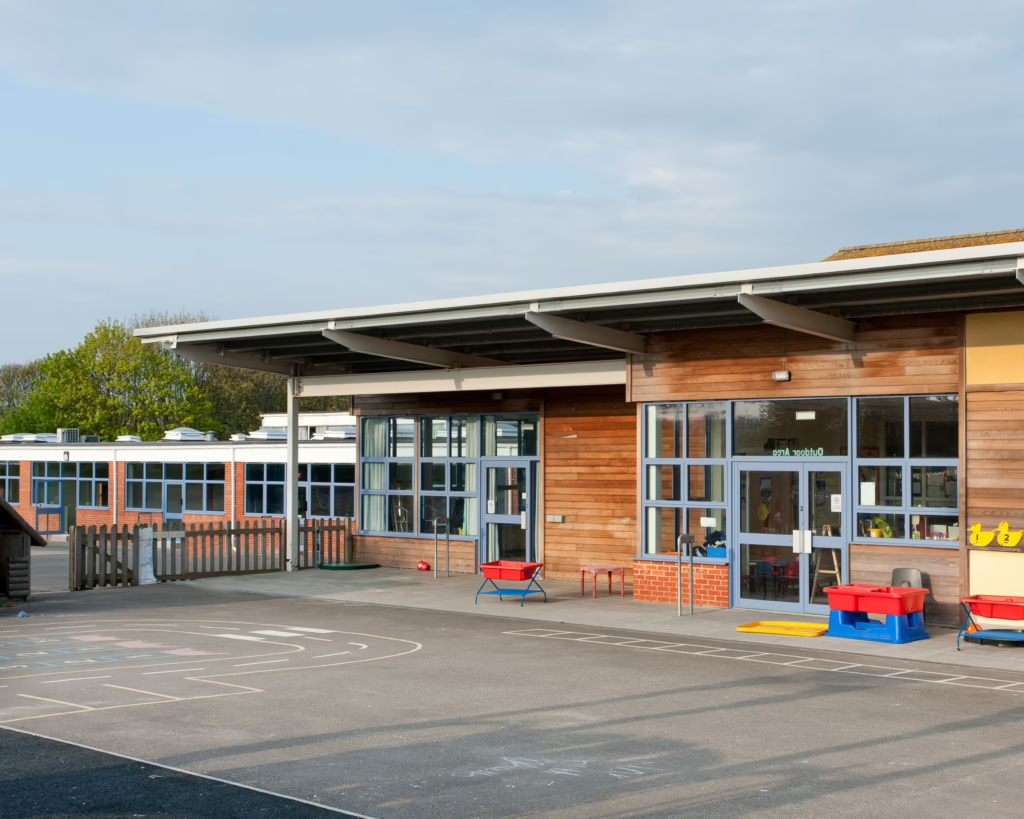Understanding the UK Curriculum
Gain a deep understanding of the UK curriculum. Learn about its key stages, subject areas, and assessment methods. Discover how to effectively teach and support student learning within the British education system.

Types of Schools in England
Secondary teachers will be employed to work in a state secondary school teaching pupils aged 11-16 years or 11-18 years. We also have private or independent schools in England but typically recruitment is for state schools.
Primary teachers will teach a variant of different subjects to one specific year group between the ages of 4-11.
The vast majority of children move from a primary school at the age of 11 to a secondary school. In most regions across England, there is no selection test for secondary school.
However in other some regions, students will sit an entrance exam called the ‘11 plus’ and if they achieve a high enough score they are able to attend a Grammar School. Those who do not achieve a sufficiently high mark attend an upper school.
At age 16 all students will take their GCSE exams to determine whether they then choose to remain in their current school if they have a sixth form (Years 12 & 13) or move to a Further Education College where they can study for A-Levels or work related qualifications. Studying A-Levels is a stepping stone towards a student deciding if they wish to then go to university.
Teaching Load
Teachers are likely to be given a teaching timetable which covers classes in years 7-11 (11-16 years of age), though teachers with a strong subject background and applicable teaching experience maybe given classes in years 12-13 (16-18 years of age).
Every teacher will have non-teaching time during the day allowing them to plan, prepare and assess. Teachers in their first year after graduating will have a reduced timetable. The amount of non-contact time varies slightly between schools.
Teachers also usually have a tutor or form group. This is a class of students you are responsible for seeing twice a day to take the register, oversee the progress of the individuals and possibly lead some more general learning activities with them.


National Curriculum, Key Stages and Examinations
State schools in England follow the National Curriculum to ensure that all children study the same subjects and schools work to the same standards. There are four Key Stages of study; Key Stages 1 & 2 relate to primary education while Key Stage 3 covers the first part of secondary education from years 7 to 9 and Key Stage 4 for years 10 and 11.
The KS3 Programme of study gives details of the subject content pupils are expected to cover during years 7-9. The KS4 Programme of Study gives details of the subject content pupils are expected to cover during years 10-11. This together with the content studied at KS3, will form the subject knowledge tested in the GCSE exam.
Each subject department will have their own scheme of work which will outline what topics will be taught and when, and give details of assessments such as end of unit tests and/or end of year exams. Teachers use the schemes of work to plan the individual lessons. The school will share these with you once you have a job and your teaching timetable has been finalised.
All students sit examinations at the end of Key Stage 4 in the Core Subjects of English, Mathematics and Science as well as their optional subjects. These examinations are GCSEs (General Certificate in Secondary Education) and are written nationally by one of three examination boards. The examination boards are regulated by Ofqual to ensure that standards are maintained and are comparable across the different exam boards. GCSE exams are graded from 1 to 9, where 9 is the highest.
Each school can choose which exam board they choose for each subject and are likely to use different boards rather than every subject using the exam set by one of the boards. Your Head of Department will tell you which exam board they use and you may also find this information on the school’s website.
Education after GCSEs
All subjects are not compulsory subjects beyond the GCSE examinations, which are taken when students are 16 years of age. Although if they fail to achieve a GCSE pass in Maths, students are required to re-sit this exam.
Years 12 & 13, are also called the ‘sixth form’ from the days when the year groups were numbered differently. The examinations taken during these years are also referred to as level 3 qualifications (GCSE is level 2).
Students will either complete Year 12 & 13 in their school or move on to a Further Education or Sixth Form College. As with GCSEs, the examinations for 16-18 year olds have been very recently reformed and are now examined at the end of the course rather than through modules taken at various points during the two-year programmes.
Most teachers joining us from overseas will not be teaching at this level, though a few who have a strong subject background and relevant experience may have this opportunity at some point during their time in England. Even if you have no intention of teaching to A-Level, it is well worth having an idea of what and how your subject is taught – it will make you a better teacher at GCSE and we would hope your enthusiasm for the subject encourages students to consider studying it at a higher level.


What is different about teaching in England?
This will obviously depend on where you have trained and taught around the world. Our programmes of study may well have much of the same content as those you are familiar with but content may be learned at different times and to different levels of complexity according to when it is taught. However, some of the main differences will not concern what is taught, but how it is taught and this is explained more during the induction training we offer.
When teaching maths and physics in particular, the emphasis is on developing a deep understanding of the concepts so that this can be applied to a range of problems. It is expected that all students make good progress over time.
Useful Links
Apply for a role in England today!
Quick links:
Search over 500+ job listings instantly
Don’t just take our word for it!
See what our clients say about their experiences with Quantum Scholars. Trust the experts in international teacher placement.

My Journey in attaining an overseas teaching job in the United Kingdom was made easy with Quantum Scholars. They had a wonderful team which maintained excellent communication and guidance throughout the process, they were patient and cooperative. They ensured that everything was completed accurately. I recommend any teacher that seeking employment in the united Kingdom to make Quantum Scholar their organization of choice.

Quantum Scholars has been fantastic in assisting me in securing a teaching position in the UK in the shortest time possible. In the last two (2) years I have tried other agencies, however, Quantum was the only one that came through for me. I would like to personally thank Amy, Robin and Steve for always being there whenever I have questions, they are literally just a email away.

My experience with Quantum Scholars was nothing but a positive one. From the moment I expressed interest through getting my job and moving to the UK I felt extremely supported. Quantum helped me not only find a school to interview with and helped me through that process but helped support me through the visa experience, moving forward with my new school and making sure that all my questions were answered. I would absolutely recommend using Quantum Scholars to anyone oversees seeking a UK teaching job!

I can’t thank Quantum Scholars enough for helping to make my dream a reality. I signed up with Quantum Scholars in February of this year, and Robin Sutcliffe was my agent. After an initial online discussion there was a lot of paperwork to send through but throughout this, Robin was a star! He guided me and kept me up to date with all relevant information…After getting the job, Amy Lloyd liaised with me to ensure I had all the correct paperwork. She also arranged a free consultation with an immigration expert, who discussed the visa application process with me. This information was invaluable and gave me the confidence to apply for my visa by myself, saving me a lot of money.

Get in touch
We will help you understand everything you need to know about the recruitment process and teaching in England. Simply register your interest whilst not forgetting to include a copy of your resume/CV.
